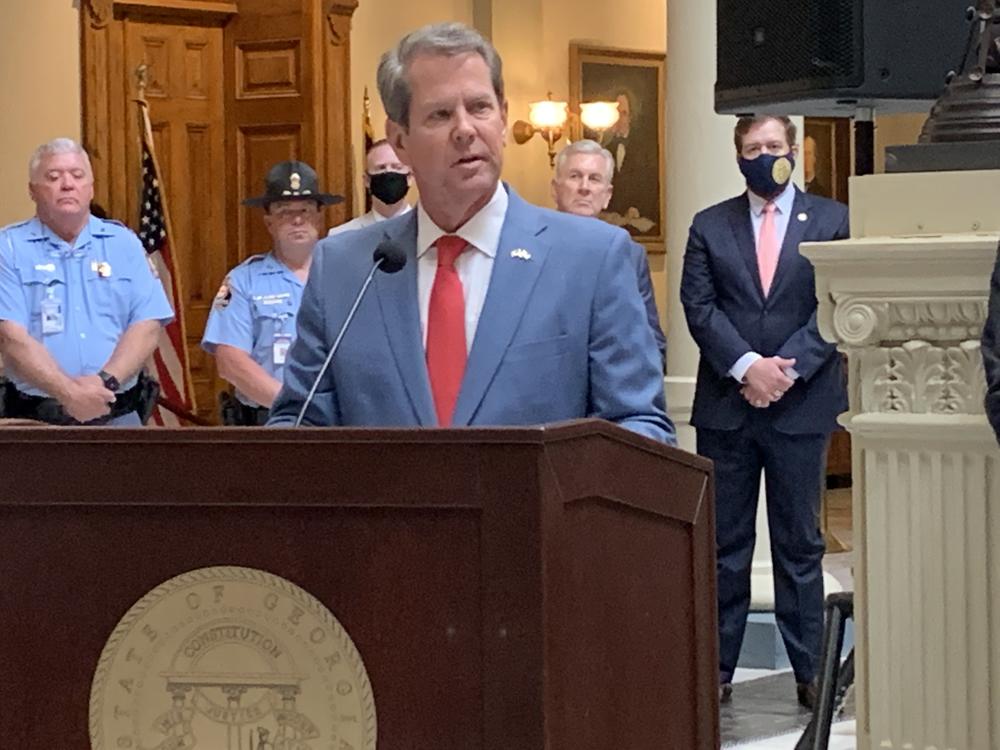
Caption
Georgia Gov. Brian Kemp preempts the ability of state's cities and counties' ability to mandate the wearing of masks.
Credit: Donna Lowry
|Updated: July 17, 2020 4:00 PM

Georgia Gov. Brian Kemp preempts the ability of state's cities and counties' ability to mandate the wearing of masks.
State Rep. Josh McLaurin, D-Sandy Springs, has no regrets about voting on March 16 to give Gov. Brian Kemp unprecedented powers in declaring a public health emergency.
"Any governor of any party would have needed this (unlimited) type of authority to respond adequately to the moment," said McLaurin.
Yet, he's now bothered by the governor's most recent order that prevents local governments from mandating citizens to wear masks.
RELATED COVERAGE:
"This doubling down reflects a total abdication of a good government mentality," said McLaurin.
On Wednesday, Kemp extended Georgia's coronavirus restrictions. The
executive order
explicitly bans municipal governments from adopting mask mandates.
"Previous executive orders - and now this order - state no local action can be more or less restrictive than ours," said Candice Broce, communications director and chief deputy executive counsel for Kemp in a tweet. "We have explained that local mask mandates are unenforceable. The Governor continues to strongly encourage Georgians to wear masks in public."
Kemp has traveled across the state, encouraging Georgians to wear masks voluntarily.
The governor's actions to quash local governments from issuing mandates for facial coverings came on the same day Republican governors of Alabama and Montana issued statewide mask orders as – like Georgia – they continue to see a rise in coronavirus cases.
"It's a constitutional over-reach," said Councilman Khalid Kamau of the City of South Fulton, one of more than a dozen cities statewide that have recently passed ordinances that include warnings and fines against people who don't wear masks.
But, Kemp's decision, while not popular with several mayors, is entirely within the power granted to him by the General Assembly in March.
Amy Steigerwalt, a political science professor at Georgia State University, said the constitution allows in "an emergency, these special, extraordinary powers can be granted that allows the governor to make decisions for the state."
During the special called meeting of the legislature on March 16, the House initially voted to cap Kemp's power under the public health emergency order to 30 days.
Steigerwalt pointed out each time the Governor renews the state's public health emergency, as he did on Wednesday, there is an ending date. The latest order ends on August 11.
McLaurin said he is glad the House took the time to focus on the order's sweeping, indefinite nature.
"It's hard to imagine a broader grant of authority," [which allows the Governor to exercise powers he] "deemed necessary to promote and secure the safety and protection of the civilian population," said McLaurin. "There's no clear guidance as to what it means."
What's worse, said McLaurin, "is the governor's staff are projecting their political bad faith onto other leaders who really do mean well and are trying to protect the public."
McLaurin is referring specifically to Ryan Matthew Mahoney, a communications advisor to Kemp. Mahoney tweeted a blunt message to mayors who have issued mask mandates, "This is about raw power and pandemic politics."
"When Mayors threaten to shut down local businesses and/or issue excessive fines to hardworking Georgians who are struggling to make ends meet, you know this is no longer about public safety," Mahoney said in the tweet.
Chair of the Georgia Democratic Party Nikema Williams issued a statement accusing Kemp of following President Donald Trump’s lead in failing “to understand the scope” of the coronavirus crisis.
“Gov. Kemp refused to implement a stay-at-home order early on and ignored public health guidance when opening Georgia’s economy back up,” said Williams, “Now, Kemp has banned local governments from passing face mask ordinances that we know keep Georgians safe.”